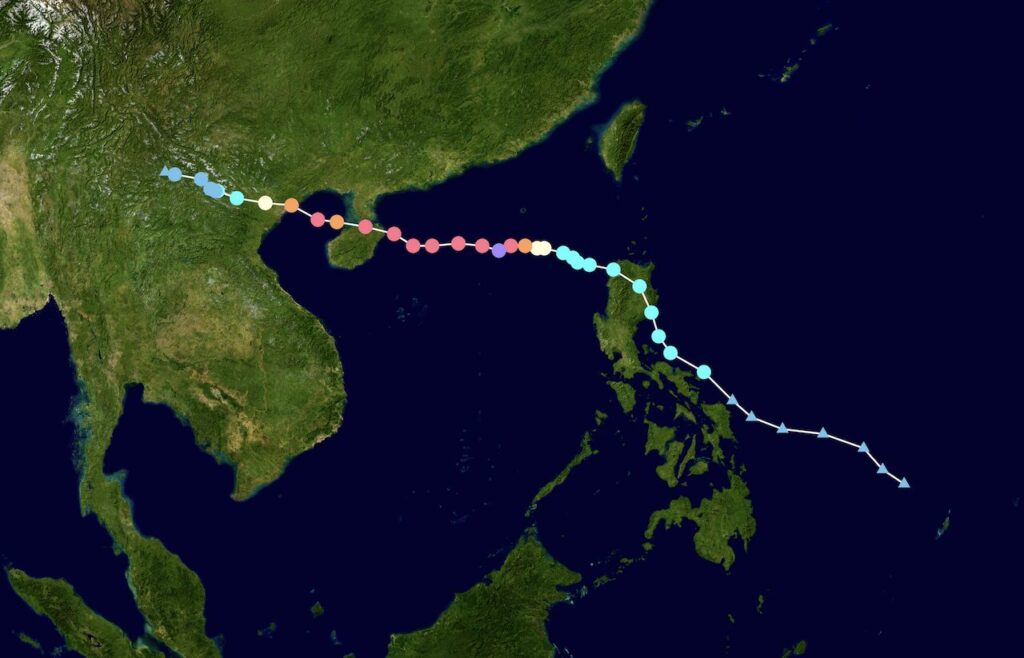South East Asia: Typhoons Cause Havoc from China to Myanmar
Three destructive typhoons and several intense storms have left a swathe of destruction as they lashed parts of South East Asia in a three week period in late August and early September.
Published 7 months ago
More Tropical Cyclones
The Philippine Atmospheric, Geophysical and Astronomical Services Administration (PAGASA) says more tropical cyclone (TCs) are entering the Philippine Area of Responsibility (PAR) than anywhere else in the world. On average, 20 TCs are recorded in this region per year, with about eight or nine of them crossing the Philippines. The peak of the typhoon season is July through October, when nearly 70% of all typhoons develop.
Typhoon Yagi
Super Typhoon Yagi initially made landfall in the Philippines on 2 September. Locally known as Typhoon Enteng, it resulted in landslides and flooding, killing 21 people in its wake, prompting school and office closures and disrupting power and telecommunication services.
Three days later, it crossed into southern China before landing in Vietnam on September 7. Typhoon Yagi caused massive destruction in Vietnam’s Quang Ninh province and Hai Phong city. With continuous heavy rainfall, flooding, and landslides affecting 26 provinces, including the capital city of Hanoi, the typhoon left 344 people reported dead or missing. Over 235,000 homes were damaged and the economic impact is so far estimated at USD 1.6 billion.
Myanmar also faced unprecedented flooding starting on September 8, as the remnants of Typhoon Yagi triggered heavy rains, displacing over 320,000 people and causing 113 reported deaths across nine regions.


Typhoon Bebinca
Typhoon Bebinca which made landfall in the bustling Chinese city of Shanghai on the morning of September 16 was the most powerful tropical cyclone to directly hit the city in more than seven decades.
The Category 1 storm, packing top wind speeds of 151 kph (94 mph) near its eye, landed in the city of nearly 25 million around 7:30 a.m. (2330 GMT), state media reported, the strongest storm to strike Shanghai since Typhoon Gloria in 1949.
Shanghai is rarely subject to direct hits from strong typhoons that generally make landfall further south in China. Yagi, a destructive Category 4 storm, roared past southern Hainan province earlier in September.
Typhoon Shanshan
In late Augusut, Typhoon Shanshan slammed into south-western Japan, the strongest storm to hit the country in decades. Shanshan was then the tenth named storm and fourth typhoon of the annual typhoon season.
After making landfall, the typhoon weakened to a severe tropical storm and continued on a north-eastern trajectory, leaving a trail of destruction across its path, with many buildings damaged by flying debris, trees uprooted and cars overturned or buried under floods.
Uncertain Trajectories in a Warming Climate
Tropical cyclones (TCs) are amongst the most damaging and costly coastal hazards in many locations, creating concerning vulnerabilities for many of Southeast Asia’s coastal communities. according to a report on the Nature.com website. However, the trajectories of TCs are uncertain in a warming climate.
The report says that understanding how a warming climate may impact the trajectories of TCs is critical to comprehending how coastal hazards in Southeast Asia may evolve in the future. To read the full report visit the nature.com website.
Typhoons in the region are now forming closer to the coast, intensifying more rapidly and staying over land for longer due to climate change, according to a study published in July.
……………………………………….
Related News:
- Typhoon Bebinca Lashes Shanghai – Reuters
- Super Typhoon Yagi Cause Severe Flooding Across South East Asia – International Red Cross
- Changes to Tropical Cyclone Trajectories in Southeast Asia Under a Warming Climate – Nature.com
- Typhoon Shanshan Causes Widespread Japan Destruction (BBC)
……………………………………….
Related Links:
……………………………………….
Find out all news, reports, links and comments posted on Noonsite, plus cruising information from around the world, by subscribing to our FREE monthly newsletter. Go to https://www.noonsite.com/newsletter/.
Related to following destinations: Batangas, Bonbonon (Negros Island), Cagayan de Oro, Calamian Islands, Carmen, Cebu City, China, Coron, Corong Corong, Dandong, Davao, Dumaguete (Negros), Kawthaung (formally Victoria Point), Legaspi, Leyte Island, Luzon (Northern Region), Maya Maya, Mergui Archipelago, Mindanao (Southern Region), Myanmar (Burma), Palawan, Philippines, Port Barton, Puerto Galera (Mindoro), Puerto Princesa, Qingdao, San Fernando - La Union, Sanya, Shanghai, Subic Bay, Surigao, Tabaco, Visayas (Central Region), Xiamen (Amoy), Yangon (formally Rangoon), Zamboanga, Zhuhai
Related to the following Cruising Resources: Hurricanes and Tropical Cyclones, Weather




